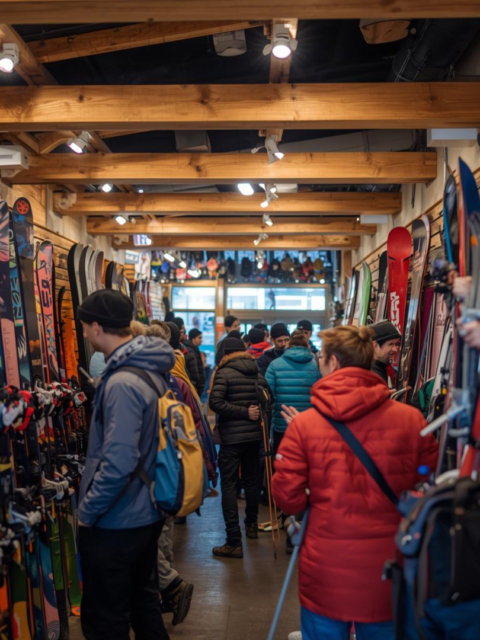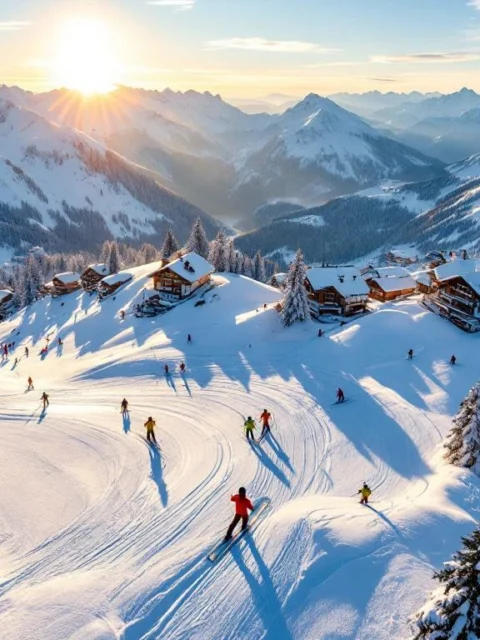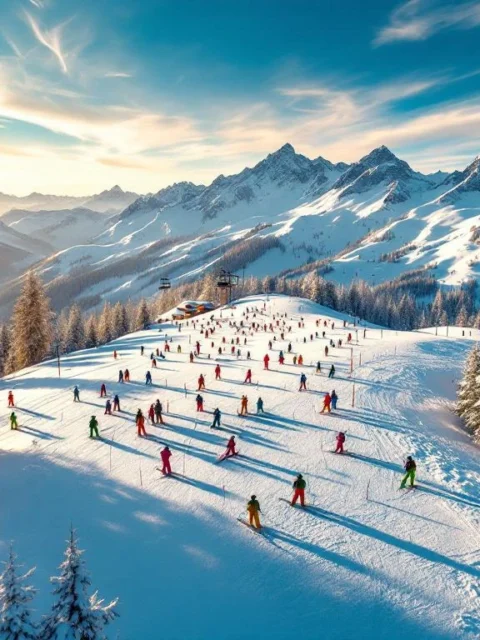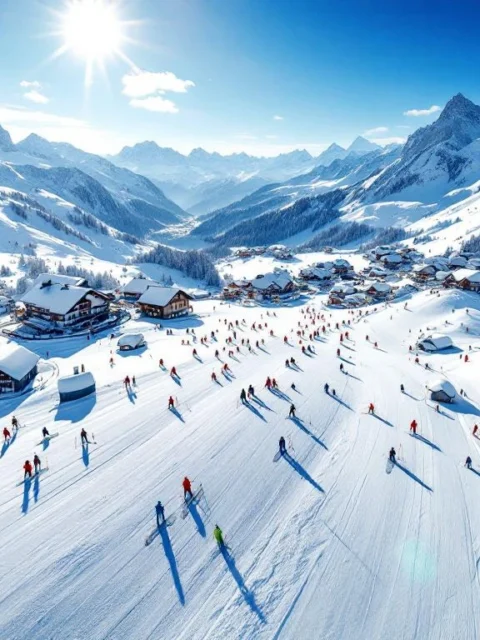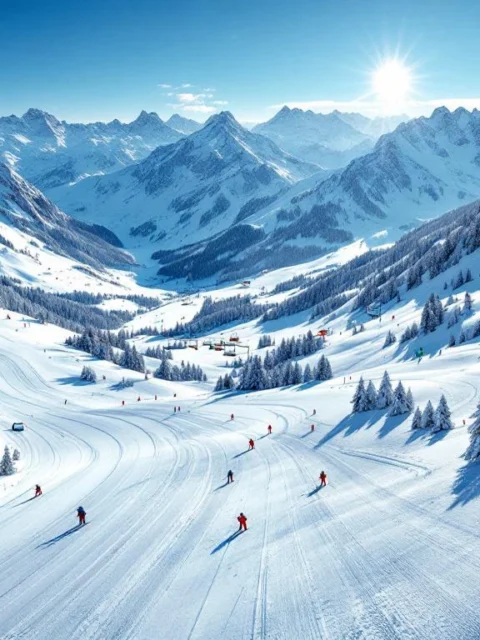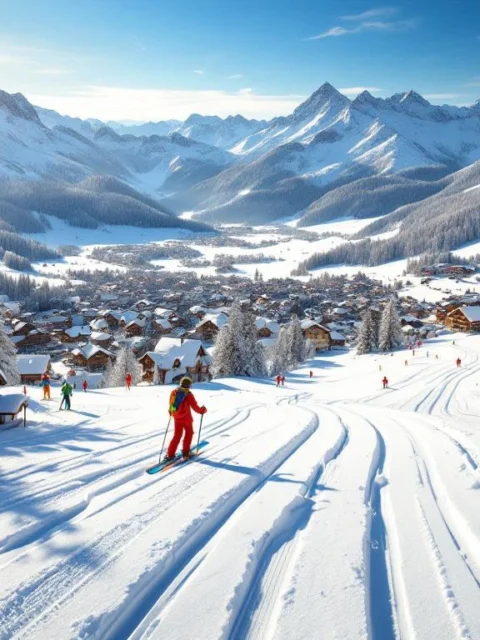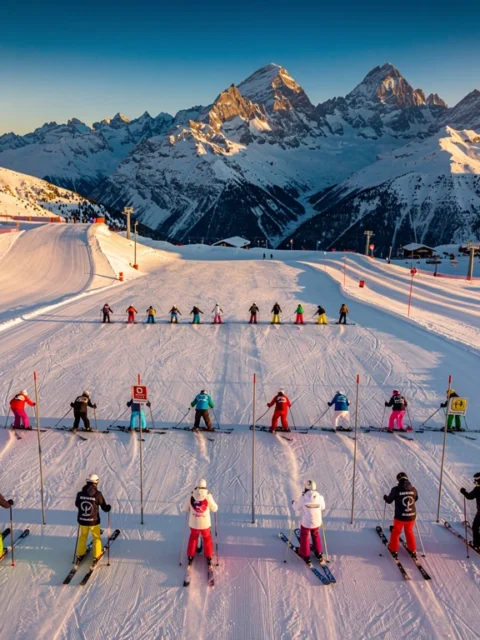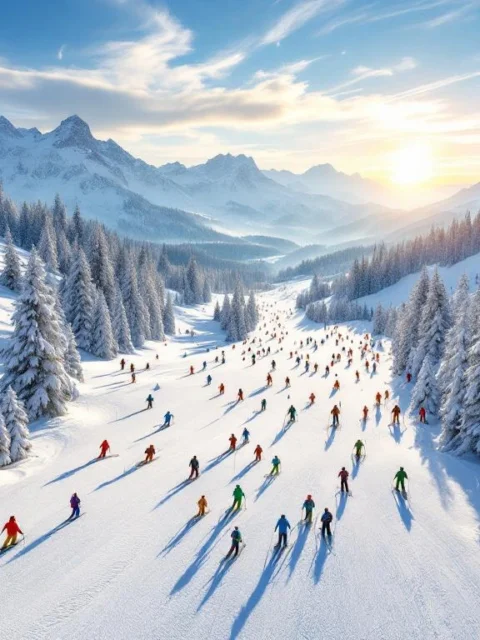How long does an average ski lesson last?

Did you know that the time you spend during a ski lesson has an enormous influence on how much you learn and how quickly you progress? Whether you’re an absolute beginner or want to improve your technique, the duration of your ski lesson is an important factor. In this article, you’ll discover everything about how long ski lessons typically last, which factors play a role, and what the ideal duration is to get the most out of your lessons. This way, you can better plan your next ski vacation and know exactly what to expect!
The Duration of Different Types of Ski Lessons
When looking for ski lessons, you’ll encounter different lesson formats. Each has its own standard duration, tailored to the purpose of the lesson and the target audience.
Private Lessons
Private ski lessons are completely tailored to your wishes. They offer the most flexibility in terms of duration. The standard private lesson usually lasts 1 to 2 hours. These one-on-one lessons are intensive, which is why a longer duration is often not necessary. You receive continuous feedback and can make significant progress in a short time.
Some ski schools also offer half-day (3-4 hours) or full-day (5-6 hours) private lessons. These longer sessions are ideal if you want to achieve specific goals or improve multiple aspects of skiing during a single lesson.
Group Lessons
Group lessons usually have a fixed duration and follow a set schedule. A standard group lesson lasts an average of 2 to 3 hours. This gives the instructor enough time to pay attention to all participants.
For group lessons, these options are common:
- Morning lessons: 9:30 – 12:30 (3 hours)
- Afternoon lessons: 14:00 – 16:30 (2.5 hours)
- Full-day lessons: 10:00 – 15:00 with lunch break (approximately 4 hours of effective lesson time)
Children’s Lessons
Children’s lessons take into account the shorter attention span of children. Lessons for young children (4-6 years) often last 1 to 2 hours, while lessons for older children (7-14 years) usually last 2 to 3 hours.
Many ski schools also offer special programs for children:
- Ski kindergarten: Half-day (2-3 hours) or full-day (5-6 hours with breaks and other activities)
- Ski camps: Multi-day programs with daily lessons of 2-4 hours
Short vs. Long Lessons
Short lessons (1-2 hours) are perfect for:
- Beginners who are not yet accustomed to the physical exertion of skiing
- A quick technical correction or refresher course
- Young children with shorter attention spans
Long lessons (3-6 hours) work better for:
- Experienced skiers who have built up their endurance
- People who want to improve quickly during a short vacation
- Exploring new areas under guidance
Factors That Influence the Duration of a Ski Lesson
The optimal duration of a ski lesson depends on various factors. Here are the most important elements that determine how long your ideal ski lesson should last.
Skier’s Level
Your skill level has a major influence on how long you can effectively learn:
- Beginners: For absolute beginners, shorter sessions (1-2 hours) are often more effective. Skiing requires new movements that can be tiring at first, both physically and mentally.
- Intermediate level: Skiers with basic skills can benefit from medium-length lessons (2-3 hours), as they have already built up some endurance.
- Advanced: Experienced skiers can handle longer lessons (3-4 hours or more) because they manage their energy more efficiently and don’t tire as quickly.
Age and Physical Condition
Your age and fitness determine how long you can learn comfortably and effectively:
- Children: Need shorter lessons due to their limited concentration abilities and quicker fatigue.
- Adults: Can usually handle lessons of 2-3 hours, depending on their fitness level.
- Seniors: Often benefit from shorter, less intensive lessons with sufficient rest periods.
Group Size
The number of participants in your lesson directly influences the ideal duration:
- Private lesson: More intensive, so 1-2 hours is often sufficient.
- Small group (2-4 people): 2-3 hours works well because everyone gets enough attention.
- Large group (5-10 people): Often requires longer lessons (3+ hours) so everyone has their turn.
Weather Conditions
Weather conditions have a surprisingly significant impact on how long a ski lesson can effectively last:
- Ideal conditions (sunny, little wind, good snow): Lessons can last longer because participants remain comfortable.
- Extreme cold: Shortens the effective lesson time because frequent warming breaks are necessary.
- Heavy snowfall or poor visibility: Makes longer lessons less effective due to reduced visibility and more tiring skiing conditions.
- Icy terrain: Makes skiing physically more demanding, making shorter lessons better.
A flexible approach to lesson duration, taking these conditions into account, leads to the best learning experience. Many ski schools adjust their schedule during extreme weather conditions to ensure the safety and comfort of their students.
Average Duration by Level and Age Group
To help you plan better, we’ve broken down the average duration of ski lessons by level and age group. This way, you’ll know exactly what to expect!
Beginning Skiers
| Age Group | Recommended Lesson Duration | Key Considerations |
|---|---|---|
| Children (4-6 years) | 1-1.5 hours | Short, playful lessons with many breaks |
| Children (7-12 years) | 1.5-2 hours | Alternating between practice and play |
| Teenagers (13-17 years) | 2-2.5 hours | More challenge, social interaction important |
| Adults | 1.5-2 hours | Focus on basic techniques, not too long due to new muscle strain |
| Seniors (65+) | 1-1.5 hours | Gentle pace, focus on safety and enjoyment |
Intermediate Level
| Age Group | Recommended Lesson Duration | Key Considerations |
|---|---|---|
| Children (7-12 years) | 2-2.5 hours | More technical focus, alternated with free skiing |
| Teenagers (13-17 years) | 2.5-3 hours | Combination of technique and more challenging slopes |
| Adults | 2-3 hours | Refinement of technique, more terrain variation |
| Seniors (65+) | 1.5-2 hours | Technique improvement with sufficient rest periods |
Advanced Skiers
| Age Group | Recommended Lesson Duration | Key Considerations |
|---|---|---|
| Children (9-12 years) | 2.5-3 hours | Advanced techniques, off-piste introduction |
| Teenagers (13-17 years) | 3-4 hours | Specific skills such as moguls, freestyle |
| Adults | 2.5-4 hours | Technical refinement, various snow conditions |
| Seniors (65+) | 2-2.5 hours | Technical corrections, energy conservation |
These times are averages – the ideal lesson duration may differ per person. A good ski instructor adjusts the lesson based on your energy, motivation, and progress during the lesson itself. Check out our selection of qualified ski instructors who can help find the perfect lesson duration for your specific needs.
The Optimal Lesson Duration for Maximum Learning Efficiency
When it comes to learning new skiing skills, there’s a ‘sweet spot’ in duration. Too short, and you barely have time to store the movements in your muscle memory. Too long, and fatigue causes you to make mistakes and develop bad habits.
Understanding the Learning Curve
Research on motor learning shows that there are different phases in learning a new skill:
- Cognitive phase (understanding what to do): takes about 20-30 minutes
- Associative phase (practicing and refining): most effective in blocks of 45-60 minutes
- Autonomous phase (automation): requires repeated practice over multiple days
For maximum learning efficiency, it’s important to stop before extreme fatigue sets in. Once your technique begins to deteriorate due to fatigue, you’re actually learning incorrect movement patterns.
Physical Aspects of the Optimal Lesson Duration
Skiing is a physically demanding activity that strains specific muscle groups you might not often use in daily life. Even if your general fitness is good, skiing muscles can quickly become tired.
Research indicates that:
- Most beginning skiers show a significant decrease in technical execution after 1.5-2 hours
- Intermediate skiers can effectively train for 2-3 hours before fatigue sets in
- Even advanced skiers experience reduced coordination after 3-4 hours of intensive skiing
Pedagogical Insights for Optimal Lesson Duration
From a learning perspective, there are several important principles that influence the ideal lesson duration:
- Distributed practice vs. blocked practice: Multiple shorter lessons (1.5-2 hours) spread over different days lead to better long-term results than one long intensive day.
- Variation in exercises: A lesson of 2-3 hours provides enough time for different exercises without becoming overwhelming.
- Reflection time: The brain needs time to process new skills. A night’s sleep between lessons significantly improves learning efficiency.
The Ideal Formula for Lesson Duration
Based on both physical and pedagogical considerations, the ideal formula for ski lesson duration comes down to:
- Beginners: 1.5-2 hours per day, preferably in the morning when you’re rested
- Intermediate level: 2-3 hours per day, with a short break halfway through
- Advanced: 2-4 hours per day, possibly split into morning and afternoon sessions
Generally, it’s better to have multiple days with shorter lessons than one long intensive day. This gives your muscles time to recover and your brain the opportunity to anchor new movement patterns.
Maximum Learning Efficiency Through Smart Planning
To get the most out of your ski lessons, we recommend this planning:
- Schedule lessons early in your vacation, so you can practice what you’ve learned afterward
- Include a rest day after 2-3 days of intensive lessons
- Consider a combination of group lessons (for social aspects) and private lessons (for specific technical attention)
- Avoid lessons at the end of the day when you’re already tired
By consciously thinking about the duration and planning of your ski lessons, you’ll be amazed at how much faster you progress!
When looking for the perfect ski lesson that meets your needs, it’s important to look not only at the price, but also at the duration and format that best suits you. At Ski-Pro, we understand that everyone is different and has different learning needs. That’s why we’re happy to help you find the ideal ski lesson with the optimal duration for your specific situation. Whether you want a 1.5-hour private lesson or a week-long program with group lessons – we’ll think along with you for the best skiing experience!
Frequently Asked Questions
How can I determine if I'm ready for a longer ski lesson?
Pay attention to signals from your body and your concentration ability. If you're still energetic at the end of your current lessons and eager to continue, you can probably handle a longer lesson. Discuss with your instructor whether your technique remains consistent throughout the entire lesson - this is a good sign that you're ready for a longer session. Start gradually, for example by adding an extra 30 minutes before moving on to half or full days.
What's better: one long ski lesson or multiple short lessons spread throughout my vacation?
Multiple shorter lessons spread throughout your vacation are generally more effective for the learning process. This gives your muscles time to recover and your brain the chance to process new movement patterns (this is called 'consolidation'). Ideally, take 3-5 lessons of 1.5-2 hours over different days, with a possible rest day in between. This prevents overexertion and maximizes your progress by the end of your vacation.
How do I physically prepare for longer ski lessons?
Start 6-8 weeks before your ski vacation with specific exercises to strengthen your leg muscles, core, and endurance. Squats, lunges, and balance exercises are excellent for skiing. Cardio training such as cycling, stair climbing, or HIIT workouts help build your endurance. Don't forget to work on your flexibility with stretching exercises. Better fitness ensures you can learn effectively for longer during your lessons and reduces the risk of injuries.
My child gets bored during longer ski lessons. What can I do?
Boredom in children during ski lessons often occurs with lessons that are too long or have insufficient variation. Choose shorter lessons (1-2 hours) with a playful character, or ask for a ski kindergarten where play and ski instruction are alternated. Discuss with the instructor about incorporating more game formats and challenges that match your child's interests. Some ski schools offer special children's classes with themes and storylines that make learning more fun.
Is there a difference between the duration of ski lessons and snowboard lessons?
Yes, snowboard lessons are often slightly shorter than ski lessons, especially for beginners. This is because snowboarding can be physically more demanding at first (more falling) and strains more specific muscle groups. Beginning snowboarders often have enough with 1-1.5 hours of instruction, while intermediate and advanced riders can handle similar lesson times as skiers. For snowboarding too: multiple shorter lessons over different days give better results than one long session.
How does altitude affect the ideal duration of my ski lesson?
At higher altitudes (above 2000m), less oxygen is available, which reduces your endurance - especially during the first 2-3 days after arrival. Plan shorter lessons (1-1.5 hours) at the beginning of your vacation if you're staying in a high-altitude ski area. Hydration is extra important: drink plenty of water before, during, and after your lesson. As your body adapts to the altitude, you can gradually move to longer lessons, usually from the third day of your stay.
How do I know when to take a break during a longer ski lesson?
Watch for warning signs such as decreased coordination, more falls than usual, or difficulty with exercises that went well earlier. Physical signals such as trembling legs, fatigue in specific muscle groups, or decreased reaction time indicate it's time for a break. A good instructor will schedule regular breaks and monitor your condition. Don't be afraid to ask for a short break yourself - 10-15 minutes of rest can significantly improve your performance for the remaining part of the lesson.


